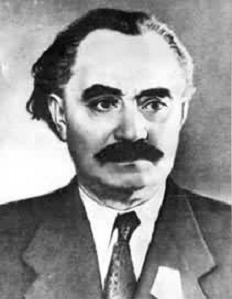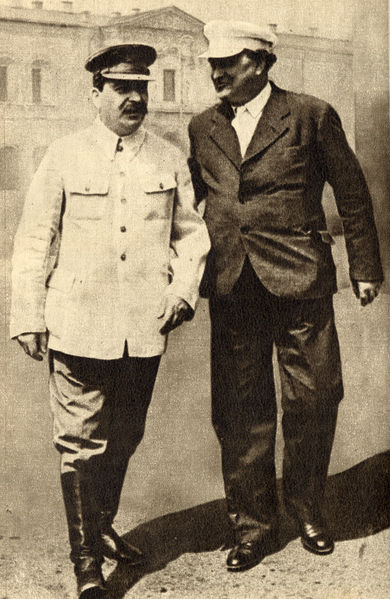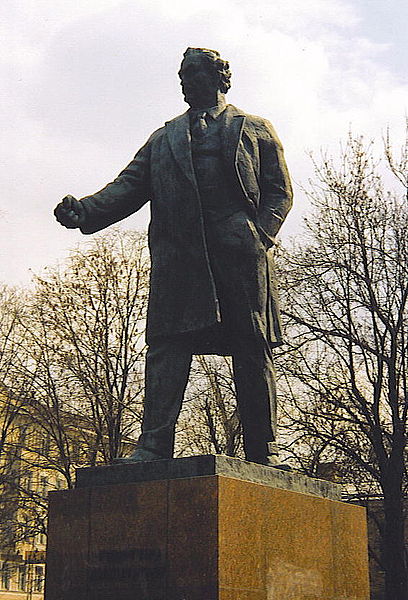<Back to Index>
- Astronomer William Lassell, 1799
- Novelist Ivan Alexandrovich Goncharov, 1812
- Prime Minister of Bulgaria Georgi Dimitrov Mikhaylov, 1882
PAGE SPONSOR



Georgi Dimitrov Mikhaylov (Bulgarian: Георги Димитров Михайлов), also known as Georgi Mikhaylovich Dimitrov (Russian: Георгий Михайлович Димитров), (June 18, 1882 - July 2, 1949) was a Bulgarian Communist leader.
Georgi Dimitrov was born in Kovachevtsi in today's Pernik Province, as the first of eight children to working class parents from Pirin Macedonia (a mother from Bansko and a father from Razlog). His mother, Parashkeva Doseva, was a Protestant Christian, and his family is sometimes described as Protestant. The family moved to Radomir and then to Sofia. Dimitrov trained as a compositor and became active in the labor movement in the Bulgarian capital.
Dimitrov joined the Social - Democratic Party of Bulgaria in 1902, and in 1903 followed Dimitar Blagoev and his wing, as it formed the Social Democratic Labour Party of Bulgaria ("The Narrow Party") - the Bulgarian Communist Party in 1919, when it affiliated to Bolshevism and the Comintern. From 1904 to 1923, he was Secretary of the Trade Union Federation; in 1915 (during World War I) he was elected to the Bulgarian Parliament and opposed the voting of a new war credit, being imprisoned until 1917. In 1906, Dimitrov married his first wife, Serbian emigrant milliner, writer and socialist Ljubica Ivošević, with whom he lived until her death in 1933.
In June 1923, when Prime Minister Aleksandar Stamboliyski was deposed through a coup d'état, Stamboliyski's Communist allies, who were initially reluctant to intervene, organized an uprising against Aleksandar Tsankov.
Dimitrov took charge of the revolutionary activities, and managed to
resist the clampdown for a whole week. He and the leadership fled to Yugoslavia and received a death sentence in absentia. Under various pseudonyms, he lived in the Soviet Union until 1929, when he relocated to Germany, where he was given charge of the Central European section of the Comintern. In 1933 he was arrested in Berlin for alleged complicity in setting the Reichstag on fire (Reichstag fire). During the Leipzig Trial, Dimitrov's calm conduct of his defence and the accusations he directed at his prosecutors won him world renown. During
the Leipzig Trial, several German aviators who had been trained in
secret in the Soviet Union were arrested. They were released when,
after secret negotiations, the Bulgarian communists Dimitrov, Vasili Tanev and Blagoi Popov tried
in Leipzig were allowed to leave for the Soviet Union. There Dimitrov
was awarded Soviet citizenship. The massive popularity he enjoyed made him an asset of Joseph Stalin's regime, and Dimitrov was appointed General Secretary of the Comintern from 1934, remaining in office until the organization's dissolution in 1943. He asserted himself as a Stalinist during and after the Great Purge. While in the Soviet Union, Dimitrov married his second wife, the Czech born Roza Yulievna, who gave birth to his only son, Mitya, in 1936. The boy died at age seven of diphtheria. While Mitya was alive, Dimitrov adopted Fani, a daughter of the General Secretary of the Communist Party of China. In 1935, at the 7th Comintern Congress, Dimitrov spoke for Stalin when he advocated the Popular Front strategy, meant to consolidate Soviet ideology as mainstream Anti-Fascism — a move later exploited during the Spanish Civil War. After the war, Dimitrov returned to Bulgaria to head the Communist party there, and in 1946 succeeded Kimon Georgiev as Premier, while keeping his Soviet citizenship. As from 1946, Dimitrov started negotiating with Josip Broz Tito on
the creation of a Balkan Federation, which was supposed to include
Bulgaria, Yugoslavia and an enlarged Macedonia. The idea eventually
emanated in the 1947 Bled accord,
which called for cooperation in several areas between Bulgaria and
Yugoslavia. The preliminary plan for the federation included the
incorporation of the Blagoevgrad Region ("Pirin Macedonia") into the Socialist Republic of Macedonia and the return of the Western Outlands from Serbia to Bulgaria. In anticipation of this, Bulgaria accepted thousands of teachers from Yugoslavia who started to teach the newly codified Macedonian language in the schools in Pirin Macedonia and issued the order that the Bulgarians of the Blagoevgrad Region should claim а Macedonian identity. However,
differences soon emerged between Tito and Dimitrov with regard to both
the future federation and the Macedonian question. Whereas Dimitrov
envisaged a federation where Yugoslavia and Bulgaria would be placed on
an equal footing and Macedonia would be more or less attached to
Bulgaria, Tito saw Bulgaria as a mere seventh republic in an enlarged
Yugoslavia tightly ruled from Belgrade. Their differences also extended to the national character of the Macedonians - whereas Dimitrov considered them to be an offshoot of the Bulgarians, Tito regarded them as an independent nation which had nothing to do whatsoever with the Bulgarians. Thus the initial tolerance for the Macedonization of Pirin Macedonia gradually grew into outright alarm. Luckily for Dimitrov, Tito's plans had become an obstacle in the way of Stalin's wish for total control over the new Eastern Bloc. The falling out between Stalin and Tito in 1948 gave the Bulgarian
Government an eagerly awaited opportunity of denouncing Jugoslav policy
in Macedonia as expansionistic and of revising their policy on the
Macedonian question. The ideas of a Balkan Federation and a United Macedonia were abandoned, the Macedonian teachers were expelled and teaching of Macedonian throughout
the province was discontinued. Nevertheless, due to his initial actions
on the Macedonian question, Dimitrov is still admired by many in the Republic of Macedonia, with a Skopje high school being named in his honor, whereas many in Bulgaria consider him to be a national traitor. Dimitrov died in 1949 in the Barvikha sanatorium near Moscow. The rising speculations that he had been irradiated (or poisoned in some other way) have never been confirmed, although his health seemed to degenerate quite abruptly. His body was embalmed and placed on display in the Sofia Georgi Dimitrov Mausoleum. After the fall of Communism in Bulgaria, his body was buried in 1990 in the Central cemetery of Sofia. His mausoleum was torn down in 1999. A massive painted statue of Dimitrov survives in the centre of Place Bulgarie in Cotonou, Republic of Benin, two decades after the country abandoned Marxism - Leninism and the colossal statue of Vladimir Lenin was
removed from Place Lenine. Few Beninois are aware of the history of the
statue or its subject. There is also an important avenue named
for him in Phnom Penh, Cambodia, despite the three decades that have
passed since the end of Communist rule.